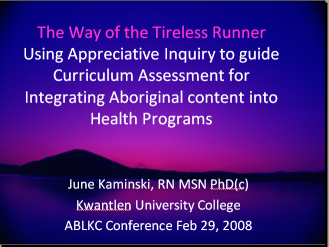The Way of the Tireless Runner: Using Appreciative Inquiry to guide Curriculum Assessment for integrating aboriginal content into health programs
by © 2008 ~ June Kaminski, MSN PhD(c)
Workshop presented at
Seeing Ourselves in the Mirror: Giving Life to Learning, Aboriginal Learning Knowledge Centre, February 28 – 29, March 1, 2008, Westin Bayshore, Vancouver. Presented on February 29th, 2008.

View PDF of PPT
34 slides, 0.74 MB
Purpose of this Workshop
This is a two phase project begun in Fall 2007
The first phase of this project has been funded by a AHHRI support grant to enable Kwantlen to conduct an assessment of the two health degree programs offered:
This assessment is being done with the view of enhancing the two programs to make them more culturally relevant for students of Aboriginal ancestry and to enable our graduates to be more competent when caring for Aboriginal persons.
Background
The name Kwantlen is derived from an aboriginal word meaning “tireless runner” or “tireless hunter” and refers to the Sto:lo Nation, now called the Kwantlen First Nation, living along the historic Fraser River. Kwantlen University College is privileged to be situated on the Kwantlen First Nations traditional lands. We work closely with our Aboriginal communities to provide educational experiences that recognize and honor their cultures and ways of knowing. The city of Surrey has experienced the largest influx of First Nations people in the GVRD area since 1996 (1,830 people from 1996 - 2001), representing 32% of the region's aboriginal population growth, while Surrey, Delta, Langley, Burnaby together accounted for 68.2% of the growth across GVRD in the same time period.
Curriculum Assessment and Recommendations for Integrating Aboriginal content into health programs is a two phase project. The first phase of this project has been funded by a AHHRI support grant to enable Kwantlen to conduct an assessment of the two health degree programs offered: the Bachelor of Science in Nursing (BSN) and Bachelor of Psychiatric Nursing (BPN). This assessment is being done with the view of enhancing the two programs to make them more culturally relevant for students of Aboriginal ancestry and to enable our graduates to be more competent when caring for Aboriginal persons. The second phase will entail the actual design of appropriate curriculum. An Appreciative Inquiry perspective is being used to plan and conduct this initial curriculum assessment.
Appreciative Inquiry is a philosophy of organizational change that adapts a foundation of social construction of meaning to the process of necessary change: in this case, a change in curriculum, pedagogy, and teaching and learning activities. Strategies that make this perspective both unique and particularly appropriate for assessing aboriginal content (or lack thereof) are symbolized by the inherent actions of esteeming, prizing, valuing, honouring, affirming, and evolving. The actual model includes four stages:
a) Discovery – assessing what exists, what is done well, and how roles and tasks can be done in even better ways to promote evolution and growth within the organization;
b) Dreaming – the articulation of a clear results-oriented vision that relates to the discovered potential and in line with the envisioned goals and “dream”;
c) Design – recommending strategies for achieving ideal results and the envisioned dream: in this case, of suitable aboriginal content and pedagogy in the two programs;
d) Destiny – providing resources and structure for curriculum articulation, adoption, and revision that provides tangible resources, strategies and processes for teaching and learning, and promoting aboriginal pedagogy within the program.
This workshop will be of particular value to any educational institution that is planning to revise the curriculum (whether in mainstream Canadian schools or in specific First Nations governed schools) to more fluidly and appropriately meet the pedagogical and learning needs of aboriginal students.
© - June Kaminski Published: 2008.
|